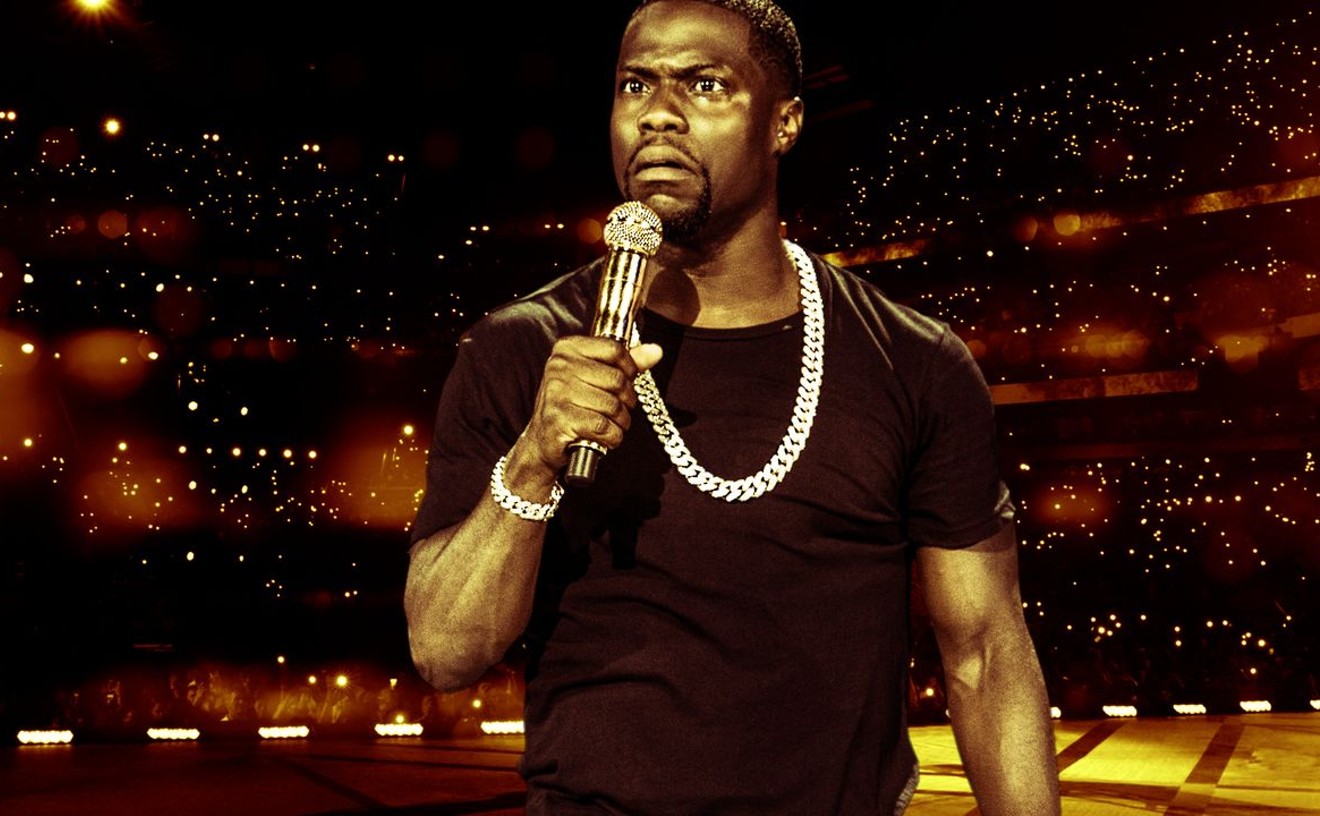The comedian/actor/playwright's intriguing paean to art, science and popular culture is being presented at the Stage Theatre by the Denver Center Theatre Company. Under the adroit direction of Randal Myler, an exuberant cast performs the 100-minute play with--no surprises here--an unbridled, infectious devotion to Martin's comic sensibilities. But what's remarkable about Myler and company's approach is that, while they successfully mine the occasional static scene for every possible laugh, the performers artfully convey, without a shred of self-serving commentary, the play's undercurrents of pathos, passion and poignancy.
In fact, the production's fanciful mood gets established before a single actor enters the Lapin Agile (pronounced lah-PAN ah-JHEEL), a still-standing Parisian watering hole where starving artists and the well-heeled bourgeois once debated weighty issues amid the free-flow of absinthe. There's even a replica of the bar's famous sign, painted in 1875 by artist Andre Gill, that depicts a costumed rabbit jumping out of a pot (originally called "lapin à Gill," or Gill's Rabbit, in homage to its creator, and later corrupted as "agile"). Framed by a translucent, occasionally backlit cityscape that lends an appropriate fairy-tale aura to Picasso's old haunt, designer Bill Curley's inviting set serves as a fitting arena for the inevitable clash between Martin's heady ramblings and clever jokes.
We're quickly introduced to the establishment's straight-shooting proprietor, Freddy (Brad Bellamy), his outspoken, aptly named wife, Germaine (Kathleen M. Brady), and an aging, under-sexed barfly, Gaston (James Lawless). Following a well-crafted episode that pokes fun at the artifice of the theater, we meet 25-year-old Albert Einstein (Bruce Turk), who's obsessed with writing his manifesto about the special theory of relativity (which, in reality, the Nobel Prize-winning physicist completed a year later). They're eventually joined by the pompous art dealer Sagot (Randy Moore), the 23-year-old Pablo Picasso (Don Burroughs) and a young well-to-do woman, Suzanne (Katie MacNichol), whose knees perpetually give way whenever an artistic type waxes poetic. Just when you least expect it, an annoying, hodgepodge creation from Martin's sketch-comedy days--the plaid-clad, tam-o'-shanter-wearing Charles Dabernow Schmendiman (Lee Eskey)--interrupts the action. On one occasion, the clueless piece of human sandpaper brays that he's developed "an inflexible, brittle building material made of radium and asbestos" that he's decided to call, naturally, "Schmendimite."
For the remainder of the play, the talented actors freshly mint a handful of double-edged epigrams about art, deftly deliver scientific in-jokes that only a pocket-protector-wearing nerd could fully appreciate, and humorously predict that, among other things, Hiroshima will be modernized and cigarette smoking will someday be banned in restaurants. The lengthy forum culminates in a mock duel between pencil-wielding participants Picasso and Einstein. As they exchange napkin scribblings, an impassioned, cocksure Picasso avows, "Mine will change the world." To which the smug, swaggering Einstein retorts, "Oh, and mine won't?" To top it all off, a notorious time-traveling pop icon (Charlie Kevin) descends upon the bar and permits Picasso to witness a vision of the Spaniard's groundbreaking 1907 painting "Les Demoiselles d'Avignon." It's an electrifying moment that instantly transforms Martin's humorous, freewheeling discussion into an arch, surreal debate.
To their credit, all of the actors invest their portrayals with a heightened physicality that borders on, but never becomes, caricature. Well, okay--there's Eskey's herky-jerky Schmendiman. But his character is meant to be a larger-than-life representation of the small-minded idiots who, to everyone's dismay, somehow show up as supernovas on the radar screens of public taste. And, in an oddly frightening way, Eskey's wonderfully crafted spastic manages to be both a parody of modern-day mediocrity and a personification of mainstream values.
As Einstein, the nimble Turk locates a fervent wellspring of creativity within his gangly scientist that bespeaks a man who possesses the requisite vision but not, as yet, the absolute proof that his theories will indeed revolutionize society. His extended, tangential bit about alphabet-letter-shaped pies is one of several Martinesque departures that serve as welcome relief from the sometimes murky recesses of the playwright's intellectual boiler room. Turk is nicely complemented by Burroughs's excellent portrait of the hot-blooded painter. As Burroughs declares, "If I can think it, I can draw it," you get the feeling that he perfectly understands Martin's assertion that there's a distinct difference between talent and genius. (This despite the fact that it's easy to envision Martin himself portraying all of the male roles.) And in addition to presenting a sympathetic portrait of the mostly peripheral serving wench, Brady's beautifully delivered set speech about the battle of the sexes is one of the highlights of the show's last, lagging fifteen minutes.
It may well be that Martin's movie-star fame and stand-up persona initially pique theatergoers' interest in this enjoyable pastiche. But the budding playwright with two brains obviously has a serious side to him that, when properly tweaked with a pinch of his own irrepressible hilarity, wins us over in the end. Indeed, as the character of Picasso ultimately observes, "This is the night that the earth fell quiet and listened to a conversation."
Picasso at the Lapin Agile, through November 14 at the Stage Theatre, in the Plex at 14th and Curtis, 303-893-4100.










